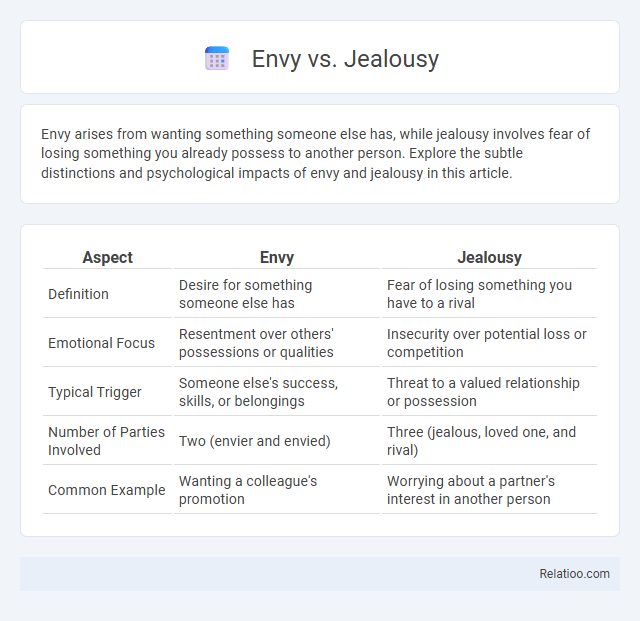Envy arises from wanting something someone else has, while jealousy involves fear of losing something you already possess to another person. Explore the subtle distinctions and psychological impacts of envy and jealousy in this article.
Table of Comparison
| Aspect | Envy | Jealousy |
|---|---|---|
| Definition | Desire for something someone else has | Fear of losing something you have to a rival |
| Emotional Focus | Resentment over others' possessions or qualities | Insecurity over potential loss or competition |
| Typical Trigger | Someone else's success, skills, or belongings | Threat to a valued relationship or possession |
| Number of Parties Involved | Two (envier and envied) | Three (jealous, loved one, and rival) |
| Common Example | Wanting a colleague's promotion | Worrying about a partner's interest in another person |
Understanding Envy and Jealousy: Core Definitions
Envy arises when someone desires what another person possesses, such as qualities, achievements, or possessions, while jealousy involves the fear of losing something valuable to a rival, often relating to relationships or status. Both emotions trigger discomfort but differ in focus: envy centers on longing for what others have, whereas jealousy centers on protecting what one already owns. Understanding these distinctions informs emotional regulation and interpersonal dynamics in psychology and social behavior studies.
The Psychological Roots of Envy
The psychological roots of envy lie in a deep-seated sense of inferiority and a longing for what others possess, often triggered by social comparisons and perceived personal deficits. Unlike jealousy, which involves fear of losing something to a rival, envy arises from a desire for someone else's attributes, achievements, or possessions, highlighting your own unmet needs or insecurities. Understanding these emotional distinctions helps in managing feelings effectively by addressing the underlying causes rather than the surface emotions.
Unpacking the Nature of Jealousy
Jealousy involves the fear of losing something valuable, often triggered by perceived threats to a personal relationship, distinguishing it from envy which centers on desiring what others possess. Unlike envy, jealousy is inherently triadic, encompassing the individual, the valued relationship, and the rival, highlighting its complex emotional dynamics. Understanding jealousy requires examining its evolutionary roots tied to attachment and social bonding, which underpin its intensity and behavioral manifestations.
Key Differences Between Envy and Jealousy
Envy involves desiring something that another person possesses, such as their success, attributes, or possessions, whereas jealousy arises from the fear of losing something valuable to a rival, often relating to relationships or attention. Envy is a two-party emotion focused on wanting what someone else has, while jealousy typically involves three parties, including the person feeling jealous, the person they fear losing, and the perceived rival. Key differences include the object of emotion--envy targets possessions or qualities, jealousy centers on fear of loss--and the emotional complexity, with jealousy usually invoking insecurity and suspicion.
Signs and Symptoms: How Envy and Jealousy Manifest
Envy manifests through feelings of longing and resentment when you desire what others possess, often leading to passive frustration and comparisons. Jealousy involves fear of losing something valuable to you, usually triggered by insecurity and suspicion in relationships, resulting in protective or controlling behaviors. Recognizing these signs helps you differentiate between wanting what others have and fearing loss, aiding emotional self-awareness.
Impact of Envy and Jealousy on Relationships
Envy and jealousy both negatively affect relationships by fostering resentment and mistrust, with envy arising from desiring what others have and jealousy stemming from fear of losing something to someone else. You may experience heightened insecurity and emotional distress, which can lead to communication breakdowns and decreased intimacy. Managing these feelings is crucial for maintaining healthy, supportive connections with others.
Social Media’s Role in Fueling Envy and Jealousy
Social media platforms amplify envy and jealousy by constantly exposing users to curated highlights of others' lives, leading Your perception of personal success and happiness to diminish. The contrast created by filtered images and selective sharing fuels feelings of inadequacy and desire, intensifying emotional responses linked to envy and jealousy. Understanding the psychological mechanisms behind social media's influence helps mitigate its impact on mental well-being and social comparisons.
Strategies to Manage and Overcome Envy
Managing and overcoming envy requires cultivating gratitude and self-awareness to recognize your unique strengths and achievements. Practicing mindfulness and reframing negative thoughts into positive affirmations helps you shift focus from others' success to personal growth. Engaging in goal-setting and surrounding yourself with supportive individuals can reduce feelings of envy and foster a healthier mindset.
Healthy Ways to Cope with Jealousy
Jealousy, unlike envy which is desire for what another has, involves fear of losing something to a rival and can be managed through self-awareness and communication. Practicing mindfulness and reframing negative thoughts helps in reducing the intensity of jealous feelings. Building trust and fostering gratitude for one's own strengths promote healthier emotional responses and relationship dynamics.
Cultivating Emotional Intelligence: Transforming Envy and Jealousy
Cultivating emotional intelligence involves recognizing the distinct emotions of envy and jealousy, understanding their triggers, and managing their impact on personal well-being. Envy arises from wanting what others possess, while jealousy stems from fear of losing something valuable, often a relationship, to a rival. Transforming these emotions through self-awareness and empathy fosters resilience, healthy relationships, and emotional balance.

Infographic: Envy vs Jealousy
 relatioo.com
relatioo.com